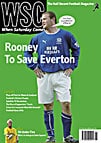 Wales’s journey from outsiders to group favourites to narrow play-off failures leaves Paul Ashley-Jones unsure whether to despair at another defeat or celebrate progress
Wales’s journey from outsiders to group favourites to narrow play-off failures leaves Paul Ashley-Jones unsure whether to despair at another defeat or celebrate progress
It’s the Euro 2004 draw and, despite my shutting myself in the other room, my wife insists on shouting out who’s in which group. I’ve not quite reached the fingers-in-ears stage but it’s getting pretty close.
Wales’s play-off defeat mirrored the campaign itself: a good first leg comparing to four wins at the start of qualifying; the second-leg defeat similar to one point from 12 in the last four games. I must keep the disappointment in context. Seeded fourth in the group, we finished second. Look at how far we’ve come since the depressing days of Bobby Gould. The change is down to Mark Hughes, who has brought stability, organisation and a team spirit desperately missing under Bobby. But to hell with context. It was the result in Belgrade that did it. We were too defensive, losing 1-0 against a team crying out to be beaten. Forget the defeat in Italy – that was always on the cards. If we had won against Serbia then it wouldn’t have mattered.
The convincing 2-1 win against Italy in the Millennium Stadium was the best game I have been to in terms of atmosphere, drama and emotion. But things crumbled as the campaign went on, individual performances declining along with results. Nowhere was this change more emphasised than with Craig Bellamy and Simon Davies, scorers against Italy but, after injury and loss of form, both missing the play-offs.
The Russia match was ten years to the week that Wales missed out on qualification for the 1994 World Cup following the infamous Paul Bodin penalty miss in a home defeat to Romania. This was always on the mind of the fans and, though they denied it, the players. Melville, Giggs and Speed all played in 1993 and the latter two each missed a chance to square the match when Russia led 1-0. We can’t blame individuals, though. The occasion got to everyone, the fans in particular. The turnout has been great (with crowds averaging over 70,000, Wales are officially the best supported national team in Europe), but on the night we couldn’t perform either. The atmosphere was muted all evening despite attempts to increase the tempo. “Do you want to holiday in Merthyr or Portugal next year? Sing!” screamed someone in the second half. It raised a laugh, but not much else.
Qualification would have been a massive boost, both financially and in terms of status, for a sport that has always had to compete with rugby union. The Football Association of Wales have muttered about the need to tighten belts and make savings following the “loss” of £3.5 million through not qualifying. Loss? Surely you don’t budget for qualification when you’re fourth seed? Still, no one had the energy to argue.
Hughes came under criticism for being too cautious, for failing to start Robert Earnshaw then playing him out of position. But there are very few who would want him to step down. An internet poll had 97 per cent in favour of him staying; rumours the three per cent were Bobby Gould and family are unproven. It seems the mistake of 1993 (when the FAW replaced manager Terry Yorath) will not be repeated and Hughes has committed to seeing out the final two years of his contract – unless Southampton/Leeds/Spurs (delete as appropriate) come calling.
Wales weren’t world-beaters in our first few games and we’re not rubbish now. We are a limited but well organised team with a couple of world-class individuals and a system the players feel comfortable with. Team spirit cannot be questioned. Our main weakness is a lack of depth, but the appalling record of our Under-21s suggests this will continue to be the case.
No thanks, dear, I don’t want to know who the Russians have drawn.
From WSC 203 January 2004. What was happening this month